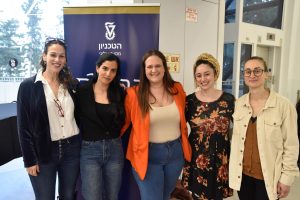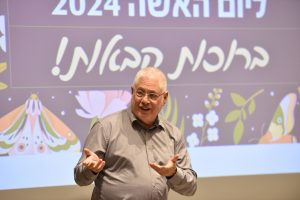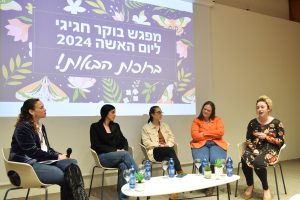“Diversity is not just a moral and social goal – it also ensures a better society”
Technion President Prof. Uri Sivan at the International Women's Day event at the Technion, dedicated to female students pursuing advanced degrees
In honor of International Women’s Day, on Thursday, March 7 the Technion held a special event with the participation of dozens of female graduate students. The event aimed at honoring female students during this challenging time featured a panel entitled “Keeping All the Balls in the Air.” This was followed by a lecture from Lihi Lapid, wife of former Israeli Prime Minister Yair Lapid. The event took place at the David and Janet Polak Visitors Center, initiated by Technion Vice President for Diversity and Inclusion, Prof. Adi Salzberg.
“This war has proven the central role women play both on the front lines and on the home front – and I have no doubt that each and every one of you has experienced it firsthand,” said Technion President Prof. Uri Sivan at the event’s opening. “I strongly believe in the importance of diversity and gender representation, not only from a social justice perspective, meaning that diversity and representation allow everyone to fulfill their full potential. These values also enable the organization itself and society to fulfill their best. In recent years, we have formed a diverse administration at the Technion with significant female representation, and I have no doubt that it is better thanks to this diversity. It is an administration that reflects a range of opinions and approaches, and therefore understands the campus and its needs better and is capable of leading the organization in the best possible way.
Technion President, Prof. Uri Sivan
“The current reality in the faculty of the Technion is the result of decades of effort to increase female representation – a particularly complex challenge in technological universities. This effort has very encouraging results: 48.8% of new undergraduate students are female. This figure is almost equal to the number of women in the population of Israel. In advanced degrees, female representation reaches 41%. To my delight, the fruits of change are also noticeable in the number of academic staff, and no less importantly, in the Technion’s administration. The Technion’s administration is more diverse, and we have reached a historic peak of eight female deans.”
One of the changes led by the administration, based on the recommendation of a special committee that dealt with the issue, is the appointment of Prof. Salzberg as vice president for diversity and inclusion.
“The place of women in this war is no longer in question,” said Prof. Salzberg. “We’ve seen 40,000 female combat soldiers, fighters, combat support, front-line medics, intelligence personnel, and more. Behind them stands a huge army of women who remained on the home front and ensured that life continued to thrive at home, at work, in massive civilian volunteer efforts, and wherever working hands and a willing heart were needed.” She told the doctoral candidates: “Your success in continuing to engage in research despite the difficulties and despite the abnormal reality is worthy of great appreciation, and therefore I thought it right to mark International Women’s Day together this year and say to you: well done and many thanks.”
Prof. Uri Peskin, dean of the Jacobs Graduate School, told the doctoral candidates: “You are an excellent group of superwomen who combine studies, work, research, and practice, and I take my hat off to you. The percentage of women in advanced degrees is improving steadily, but we continue to think about how to maintain this trend.”

Panel participants from right to left: Naama Cohen, Adina Fried, Rony Ben-Zvi Elimelech, Coral Hamo Goren, and Prof. Tzipi Horowitz-Kraus.
Four doctoral candidates from various faculties at the Technion participated in the panel “Keeping All the Balls in the Air.” The panel moderator, Prof. Tzipi Horowitz-Kraus from the Faculty of Education in Science and Technology and the Faculty of Biomedical Engineering, said that her husband, a pediatric neurologist, was called up as a trauma doctor and served for 100 days. “I was left bewildered, with three children aged 8 to 15. As a faculty member, I had to continue managing a very diverse lab with both female and male members, Arabs, Jews, and Druze. In addition to everything else, my research is based on MRI imaging in children, and it’s not easy to find parents and children who will come to campus for such tests at this time. Therefore, even though I am no longer a doctoral student, I am very familiar with your feelings and the level of concentration needed during this time. And most importantly, I embrace you.”
Adina Fried, a doctoral student in the Faculty of Biomedical Engineering, resides in the Technion’s Graduate Student Village. In her doctoral work, she researches models for developing drugs for intestinal diseases under the guidance of Prof. Shulamit Levenberg. “On October 7, I was nearing the end of my maternity leave, with a small baby and a three-year-old child, approaching qualifying exams. My husband and I are both from a special forces unit, and on that Saturday, he immediately went to the base. He recently returned home after 152 days of reserve duty. I was left with two young children, which wasn’t easy, but the thought of returning to the United States, where I was born and where my parents live, never crossed my mind. I requested to postpone my return from maternity leave due to the situation, and Prof. Levenberg fully supported me and strengthened my decision. When the situation stabilized, I took the exams and passed them successfully.”
Rony Ben-Zvi Elimelech, who is about to complete her doctorate degree in the Ruth and Bruce Rappaport Faculty of Medicine, researches mechanisms of retinal nerve regeneration. Additionally, she is the founder and CEO of the Wisemama Mentoring Project, which supports women combining parenthood and academic studies. “At the beginning of October, I was recovering from a very difficult childbirth experience, during which I faced medical challenges resulting from the pregnancy, and when I started to recover, October 7 happened. In the reserves, I am a administration officer in the Air Force, and when I wasn’t called up, I was offended. After I got over my offense, I decided that my role in holding down the home front was no less important. I viewed taking care of my children as a national mission. I returned to research, planned how to progress with my supervisor, and then suddenly, I was called up for reserve duty. I consulted with my supervisor, and she immediately said, ‘Now is not the time to say ‘no’ to reserve duty.’ In the end, I completed 45 days of reserve duty, juggling duties in the lab, managing the organization, and preparing for the opening of another challenging year of our mentoring project for student mothers. I want to thank the Technion and the Jacobs Graduate School for doing everything for the sake of its students.”
Naama Cohen recently began her doctorate studies in the Andrew and Erna Viterbi Faculty of Electrical Engineering and Computer Science. “After watching the initial reports on October 7, which seemed as strange as watching 9/11, the alarm bells rang for me, and I said to my husband, ‘Let’s get ready for reserve duty.’ Indeed, we were both called up immediately – he to the Telecommunications Center and I as an IDF officer in the reserves. The period in the reserves was challenging, but it allowed me to contribute. Since I didn’t find the time or mental space to engage in research, I put the research aside for this period, and during home leaves, I allowed myself to rest. Only in the past month have I tried to return to my routine – I organized documents, reread things, everything needed to return to research and be prepared to continue the Ph.D. I feel that to some extent, this break allowed me to look at the research with a fresh perspective and critique.”
Coral Hamo Goren, a doctoral student in the Faculty of Architecture and Town Planning, focuses on integrating machine learning in urban analysis. “When the war broke out, my husband immediately told me ‘You’re an operations officer in the Givati brigade, they need you, I’ll stay with the kids.’ And indeed, I went to reserve duty and I’m still there. At first, I put my doctorate on hold and every home leave was dedicated to the children. Even that wasn’t easy, because at night, I was in the operations room receiving and relaying reports on casualties and injuries, and then I came home to be with them, to comfort them. Only recently did I return to my doctorate and thankfully, the professors and mentors at the Technion understand the difficulty and provide significant assistance. That’s the spirit of the Technion – seeing the person.”




